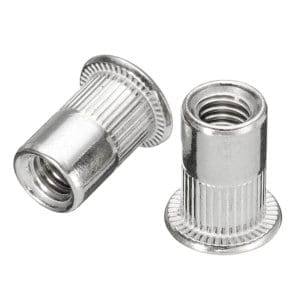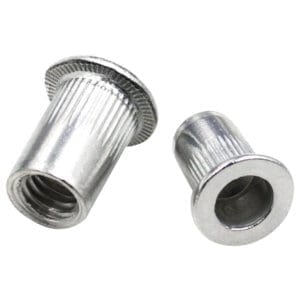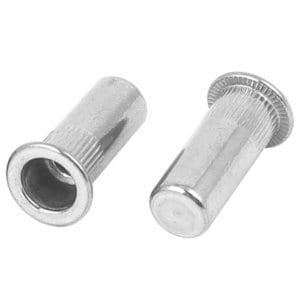Rivet Nut Fasteners
Find rivet nut for your tool. Choose from our selection of open-ended and closed-ended (sealed) type in steel with zinc-chromate plating to stainless steel for excellent weather resistance. Check out our fastener selection below for more information on choosing the right fasteners.
Get 15% of Fasteners
Have one of our tool? Get 15% off fasteners with product registration. Account registration and validations are required. Create or Login Now.
Open Ended Rivet Nut Options
- Steel with Zinc Chromate Plating
- Stainless Steel
- #8 – 1/2″ UNC
- M4 to M10
Close Ended (Sealed) Rivet Nut
- Stainless Steel
- M5 to M8 Coarse
How to choose your rivet nuts
When fastening to metallic based products, it would be best choose the same metal as the base product to prevent galvanic corrosion. If due to other factors such as exposure to the element, material such as aluminum or stainless steel could be considered if mitigation against galvanic corrosion is properly applied.
Galvanic corrosion is an electrochemical process in which one metal corrodes preferentially to another when both metals are in electrical contact, in the presence of an electrolyte. -source Wikipedia
The simplified explanation would be that whenever two different types of metal are fastened together, due to the composition of the metals and the interaction of the metals, one metal would corrode faster than if the same metals are fastened together.
Whenever possible, it is best to use the fastener of the same material as the metal that you are fastening. If this is not possible, a barrier should be created between the two metals to prevent the galvanic corrosion.
In some application, epoxy glue, rubber washer, paint or other non-conductive materials are used for barrier.
No, this happens even if you join seemingly non-corrosive metals such as Aluminum and Stainless together. If you fasten two aluminum plates with a stainless rivet, the aluminum plate around the fastened joint would actually corrode and the fastened joint would eventually fail due to the enlarged hole.
No, this is just a quick overview of galvanic effect. For repairs, it is best to follow the manufacturer’s guideline for proper fastener selection. For manufacturer, it is best to choose the fasteners with the same metal as the structure/project or use a barrier between any two dissimilar metals. For more details please check out these sources for more information.
Once the proper material has been determined, here are a few things to consider regarding the selection of the rivet nut and rivet stud.
- Choose the appropriate rivet nut/stud for the required bolt sizes indicated by the manufacturer or application.
- Please note that the bolt size would also affect the hole size as each rivet nut/stud has its own hole size requirement.
Grip ranges refers to the optimal thickness of material that the rivet nut is designed for in order to achieve the specified sheer and tension strength. Using the rivet outside the specified grip range might cause unexpected failure.
This value refers to how much the rivet nut/stud could handle before the possibility of the rivet nut/stud to start spinning. If your application requires specific torque value, this property is important to consider to prevent the rivet nut/stud from becoming loose.
- The shear strength of the rivet nut is determined by the bolts installed into the fastened rivet nut as the installed bolt would become the integral part of the fastened system. As a result, the shear strength is typically determined by the bolt used in the final assembly.
- For rivet stud, the bolt shear strength is according to the grade/size of the equivalent bolt inside the rivet stud.
- This is the amount of force that would result in failure of the installed rivet nut with bolt fastened.
- The force that the installed rivet stud could handle axially before failure.
- It is similar to the force that would cause the thread to strip on standard bolt and nut installations.
Generally there are two types of rivet nuts with various styles available and they are not mutually exclusive. For example, there are large flange knurled close-ended rivet nuts and large flange knurled open-ended rivet nuts available.
Types:
- Open-Ended
- Close-Ended (Sealed)
Styles:
- Large Flange
- Knurled
- Split
Open-ended rivet nuts are the most prevalent on the market; however, if the rivet nut is exposed to the element, it would be best to use stainless steel close-ended (sealed) type rivet nut to prevent water from leaking into the structure.
Rivet Stud are inherently close-ended but not sealed like close-ended rivet nuts as the bolt on the rivet stud is not welded to the body to have complete water tight seal. There are different flange sizes and specification from various manufacturers. Please choose one that satisfy your requirement.



